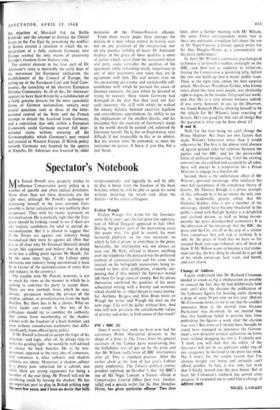Spectator's Notebook
MR Enoch Powell very properly wishes to influence Conservative party policy in a number of specific and often radical directions. More often than not these directions are the right ones, although Mr Powell's technique of expressing himself in the most extreme form possible is better calculated to win publicity than acceptance. Thus with his recent statement on nationalisation. He is perfectly right that the Tory party should be looking round to see if there are any realistic candidates for total or partial de- nationalisation. But it is absurd to suggest that if the Tories are against one industry being nationalised they must be against all. (Not that it is at all clear why Mr Emanuel Shinwell should accept this argument and believe that in doing so he has a telling point against Mr Heath: for by the same zany logic. if the Labour party advocates one industry being nationalised it must be in favour of the nationalisation of every firm and industry in the country.).
The trouble with Mr Powell, however, is not so much his views as the manner in which he is seeking to convince his party to accept them. There are two methods from which he may choose: persuasion within the privacy of the shadow cabinet, or proselytisation from the back benches. But there has to be a choice. What no party leader can accept is that any of his colleagues should try to combine the authority that comes from membership of the shadow cabinet with the freedom of a back-bencher, and issue without consultation statements that differ significantly from official party policy.
If Mr Powell is forced to accept the logic of his situation—and logic, after all, he always tries to make his guiding light—he would be well advised to choose the back benches. He is, by tem- perament, opposed to the very idea of consensus, and consensus is what cabinets and shadow cabinets are about. Moreover, a shadow cabinet is a pretty poor substitute .for a cabinet, and while there are strong arguments for being a member of the real thing, Mr Powell will not be sacrificing much by leaving the shadow. He has an Important part to play in British politict_oier the next few years, and I have no doubt that ba
temperamentally and logically he will be able to play it better from the freedom of the back benches, where he will be able to speak his mind without incurring the wrath—and often the denials—of his senior colleagues.


































 Previous page
Previous page